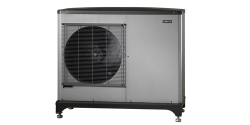

Heat pump manufacturers are predicting a downturn of installations following the announced Renewable Heat Incentive delay.
News that the RHI is now expected to launch in Spring 2014, with plans to extend the Renewable Heat Premium Payment (RHPP) in the meantime, has caused industry-wide dissapointment.
“Given that the Department for Energy & Climate Change (DECC) secured a £864 million budget, it is difficult to accept the repeated delays which mean the domestic scheme will only run for a maximum of a year before the next election and more uncertainty,” said Simon Lomax, managing director of Kensa Engineering.
He warned that continued setbacks and reduced funding were likely to have a devastating impact on renewable heating businesses, many of which have invested heavily in readiness for the RHI.
Phil Hurley, managing director of NIBE, agreed that further delays mean the government is unlikely to meet its target of achieving 6.8 million heat pump installations by 2030.
However, he remains confident in the abilities of heat pumps and other renewable technologies going forward.
“Renewable heat will play a central role if the UK is going to achieve its carbon reduction targets – so further delays to the domestic RHI are certainly disappointing,” said Hurley.
“We are committed to developing renewable heating solutions that can effectively meet growing demand in line with official targets. However, it takes more than just a well-engineered product to drive uptake. Confidence in secure, long-term tariff support is still needed for these technologies to compete with conventional heating systems on the necessary widespread scale.
After speaking to the all-party Commons Select Committee on Energy & Climate Change investigating the RHI, Lomax added: “The Committee appeared concerned that progress towards the legally binding 2020 renewable heat targets was being compromised by the shambolic RHI policy.
“While DECC did manage to launch Phase One covering commercial and industrial buildings in late 2011, deployment levels are well below target and there is a marked absence of ground source heat pump installation as the tariffs are simply far too low and based upon woeful evidence. Thankfully, DECC has belatedly accepted that the tariff does need to increase to prevent continued market distortion but progress towards an announcement is painfully slow. As a consequence, the sector is suffering significant job losses and company failures.”
Market statistics compiled by BSRIA show that ground source heat pump sales have fallen by over 40% since hitting a peak in 2009. As of March 25, just 31 ground source heat pump installations have been accredited to the Phase One scheme generating a total payment of less than £40,000.
Lomax also warned that there is an emerging likelihood that installations will not be performed in accordance with the Microgeneration Certification Scheme (MCS) because the potential carrot – eligibility to the RHI – is not seen as worthwhile.
If you'd like to keep up-to-date with the latest developments in the heating and plumbing industry, why not subscribe to our weekly newsletters? Just click the button below and you can ensure all the latest industry news and new product information lands in your inbox every week.